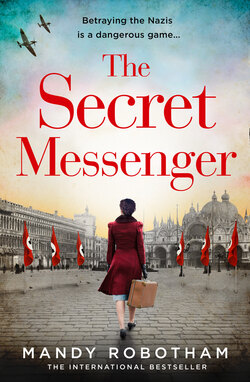Читать книгу The Secret Messenger - Mandy Robotham - Страница 6
Author’s note
ОглавлениеWar is ugly. Wherever it strikes, it destroys people, families and places, decimates lives and precious objects. Yet being so widespread, conflict also happens in beautiful places, and it was that contrast of light and dark which prompted The Secret Messenger. For me, there is no more stunning or fantastical place on earth than Venice; since my first trip in 1990, I’ve been beguiled on countless visits by the idea of a city effectively floating. I’m still in awe of its very existence and its beauty.
When I began to research how World War Two affected Venice, it became clear that historians were less captivated by its story of Resistance as perhaps in France or the Netherlands; that Venice, by comparison, had experienced a ‘soft’ war. What research I found seemed brief and factual, but those details of Venetian life – of how Venetians existed day by day – were scant. On a research trip (yes, of course, I needed to go back again!) I walked miles through Venetian calles, itching to know which areas of the city played their part in the fight against the Nazis and fascists combined.
It wasn’t until my return home that I struck gold; a chance email launched into cyberspace sparked a reply from the wonderfully named Signor Giulio Bobbo, a historian at IVESER, the Venetian Institute for the History of Resistance and Contemporary Society. His own area of expertise? The Resistance in wartime Venice. It was like manna from heaven.
Thanks to Giulio, his grounding in factual research and the nuggets of priceless detail about real life in wartime Venice, the book began to take shape. At last, I could see a Venice under the cloak of war. The more Giulio and I traded emails, the more my search seemed to run parallel to the quest within the story – it seemed only fitting Giulio’s character should make an appearance, along with Melodie the cat who, by the way, is very real and does indeed love a warm photocopier!
I knew also that I wanted to highlight the role of women in the eventual victory over the Nazis; not only the bravery of undercover agents, but the army of female messengers across Italy – Staffettas – who helped the Allies to victory. It’s hard for us in this day of social media and instant messaging to understand the value of transporting a simple slip of information on foot or by boat, but in those times it was crucial. Life-saving, in fact. Without the thousands of mothers and grandmothers across Europe who risked their own lives by carrying contraband in prams and shopping bags, we might never have seen peace at all. I hope Stella is an embodiment of those women – selfless for those around them.
Once Stella and her city became my backdrop, the next element was easy. Where else is better suited for romance to blossom than a place that hovers amid the constant ripple of water and sits under the most stunning of sunsets? And, of course, my Venice is in there too: the Accademia is my favourite bridge, Campo Santo Stefano among my preferred piazzas to people watch, and there is a small café in the corner opposite the church doorway where I have sat many a time with a good coffee and my notebook, imagining myself as a writer. Oh, and to the side is a very good gelato parlour. You can’t escape it – Venice gets under your skin.
I hope I have paid homage to those who braved the conflict in Venice; there is no such thing as a ‘soft’ war when one person loses a life, one mother a son. Venice lost too. But as with the previous centuries of invasion and plague, it recovered. It remains a jewel. Glittering. And I’ll be back there soon.
